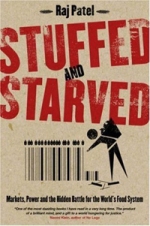Book Review Essay: Raj Patel
 Stuffed and Starved: The Hidden Battle for the World Food System. Raj Patel. Brooklyn, NY: Melville House. 2007. 398pp. US$19.95 pb.
Stuffed and Starved: The Hidden Battle for the World Food System. Raj Patel. Brooklyn, NY: Melville House. 2007. 398pp. US$19.95 pb.
The Value of Nothing: How to Reshape Market Society and Redefine Democracy. Raj Patel. NY, NY: Picador. 2010. 256pp. US$14.00 pb.
Read the review by Sean Johnson Andrews of Columbia College Chicago, forthcoming in the Review of Radical Political Economics and now available in OnlineFirst:
For a scholar of economic development, Raj Patel has received an unusual level of media attention. He has appeared many times on Democracy Now, MSNBC, and NPR to discuss both of his books and their intersection with current events. He even received the legendary “Colbert bump” by appearing on The Colbert Report upon the publication of his latest book, The Value of Nothing. This last appearance did more than just introduce his book to a larger audience; it also affirmed (for a certain sect) his status as a deity (James 2010).1 In a subsequent appearance on Colbert’s program, Patel addressed his newfound status, saying
I’m the last person who should be the messiah. I’ve spent a lot of time arguing that what we need is not to believe in great leaders and people bringing hope and change; [arguing instead] we can change the world, actually, through small acts of rebellion and mutual aid. So I think the whole idea of being the messiah is entirely bogus. […] The whole point of social change is not to follow leaders, but actually that we can think for ourselves. […] Questioning the world around you; questioning why it is that resources are distributed the way that they are is a good start. (Colbert 2010)
This exchange provides an excellent insight into Patel’s basic reflex, which informs both of his books as well as his other more academic work. That reflex is to inform a popular audience of the benefits of “thinking for themselves,” especially about the basic frameworks of our culture and society, including but not limited to food, property, and the social production and measurement of value.
Click here to continue reading; follow this link to see the latest issue of the Review of Radical Political Economics and this one to see new articles and reviews in OnlineFirst.
































































































